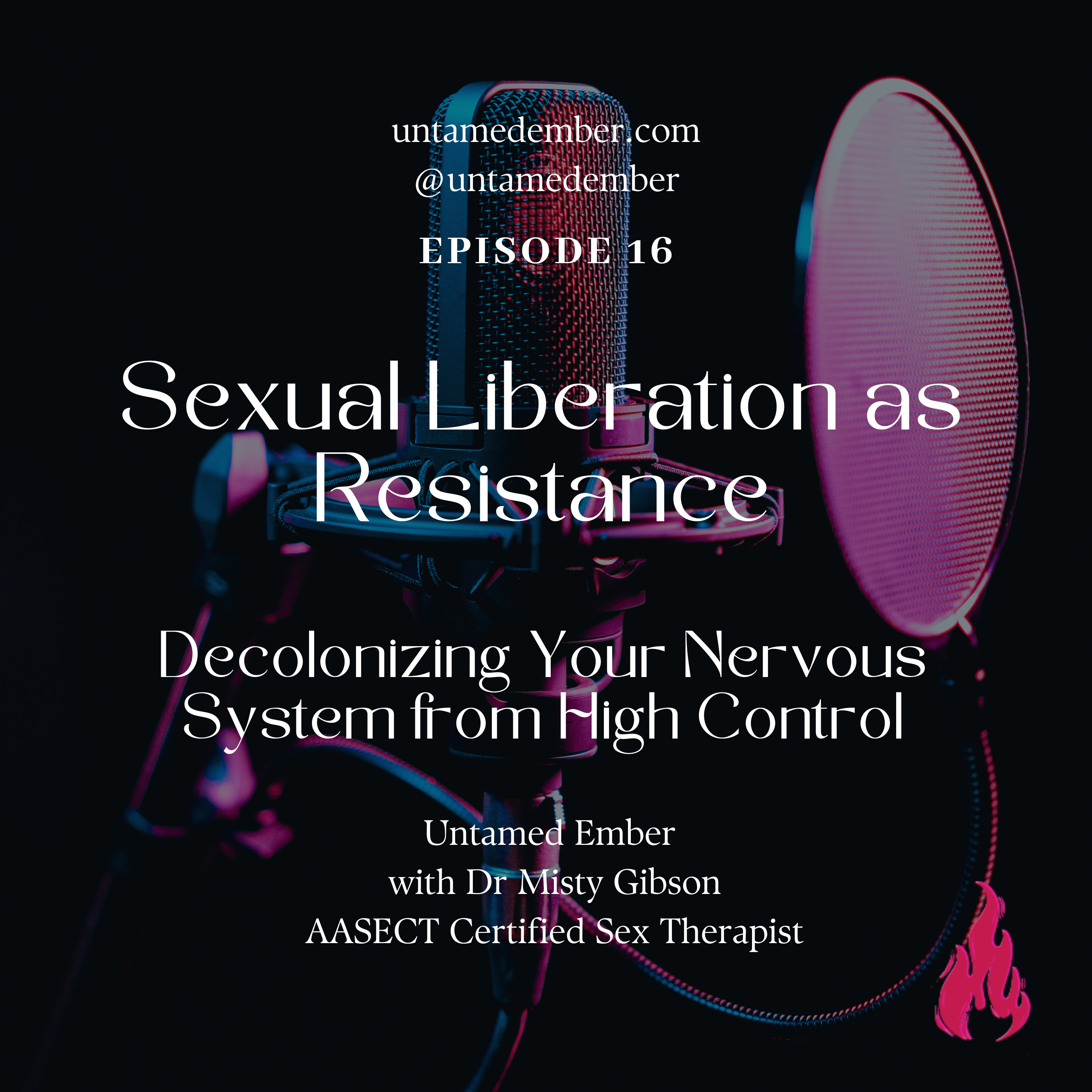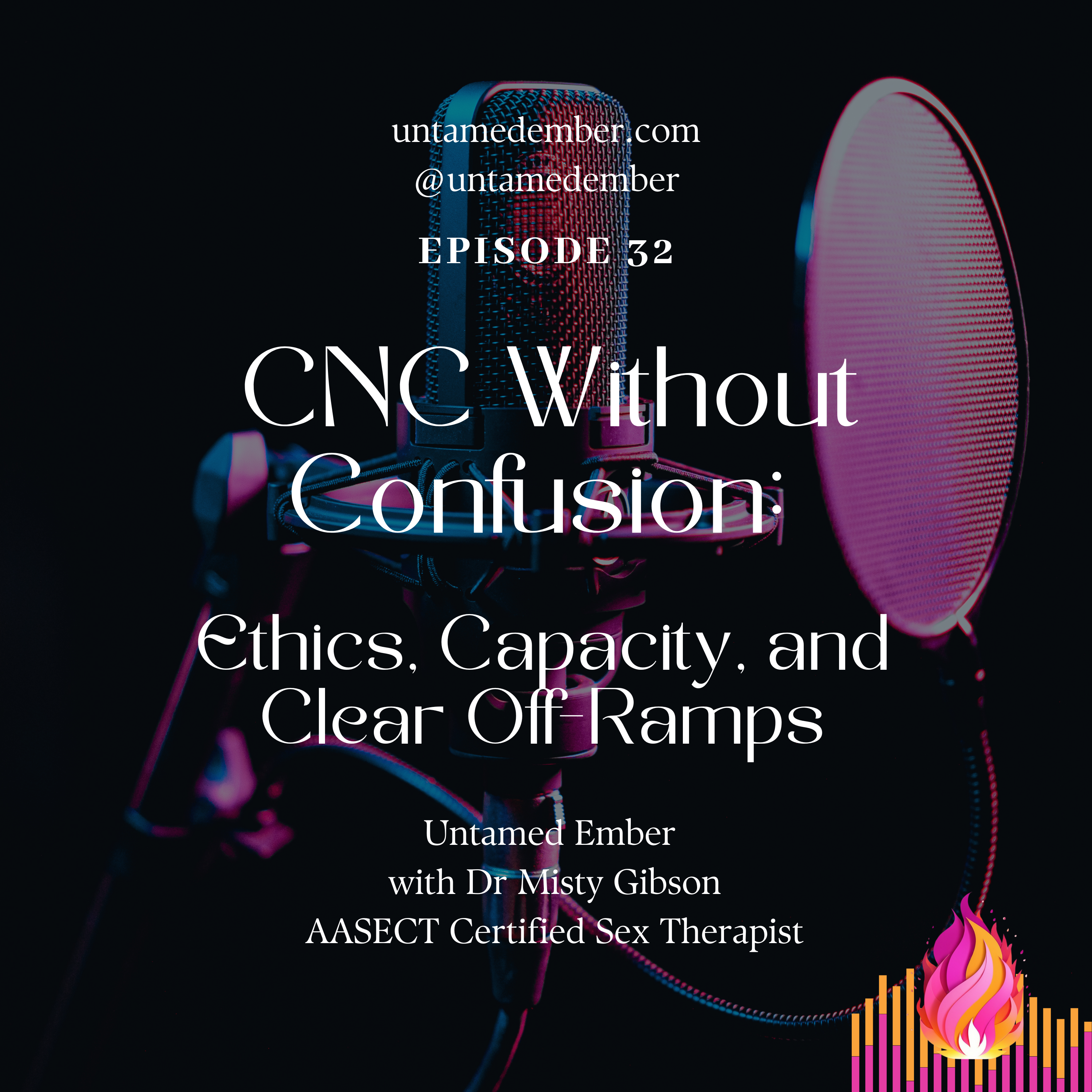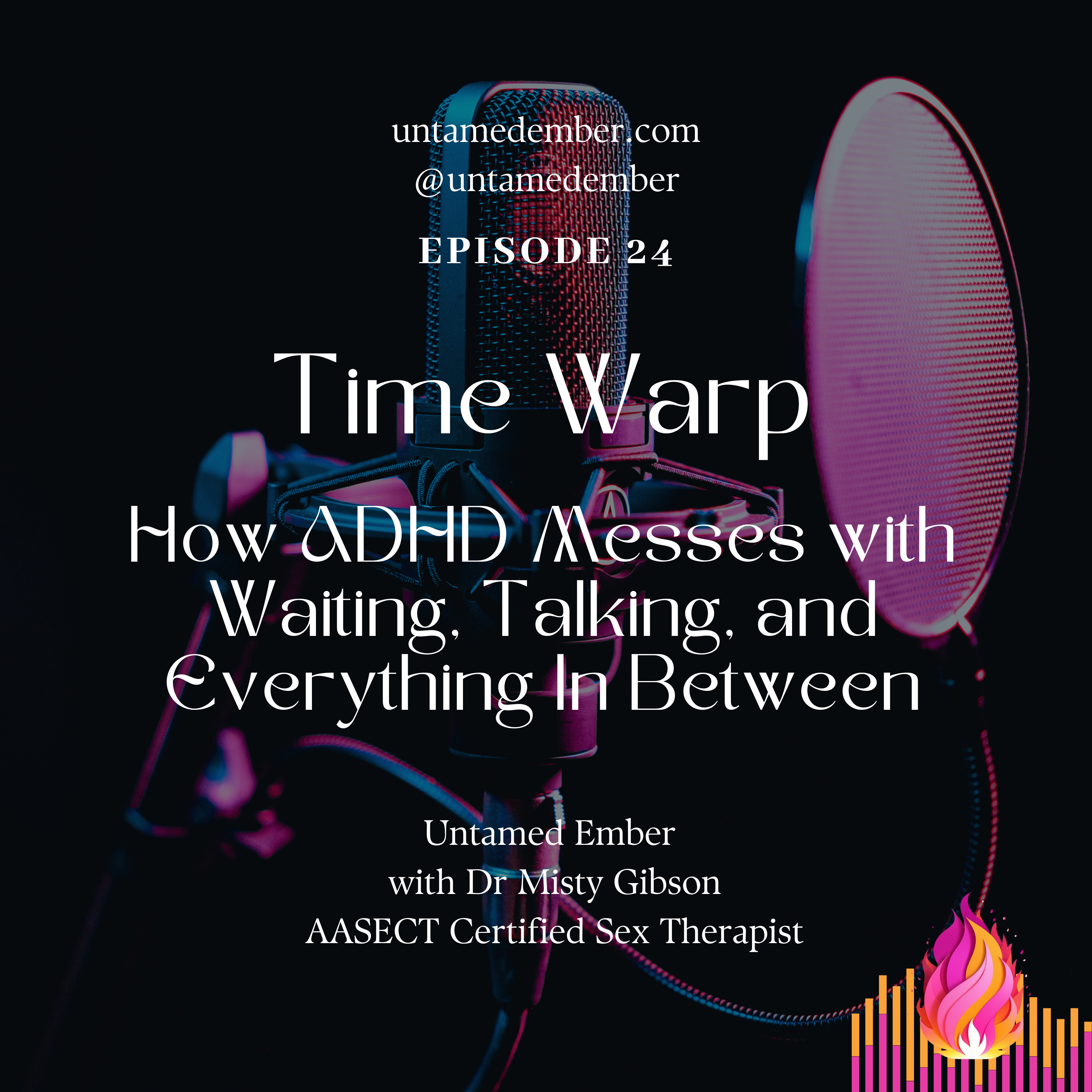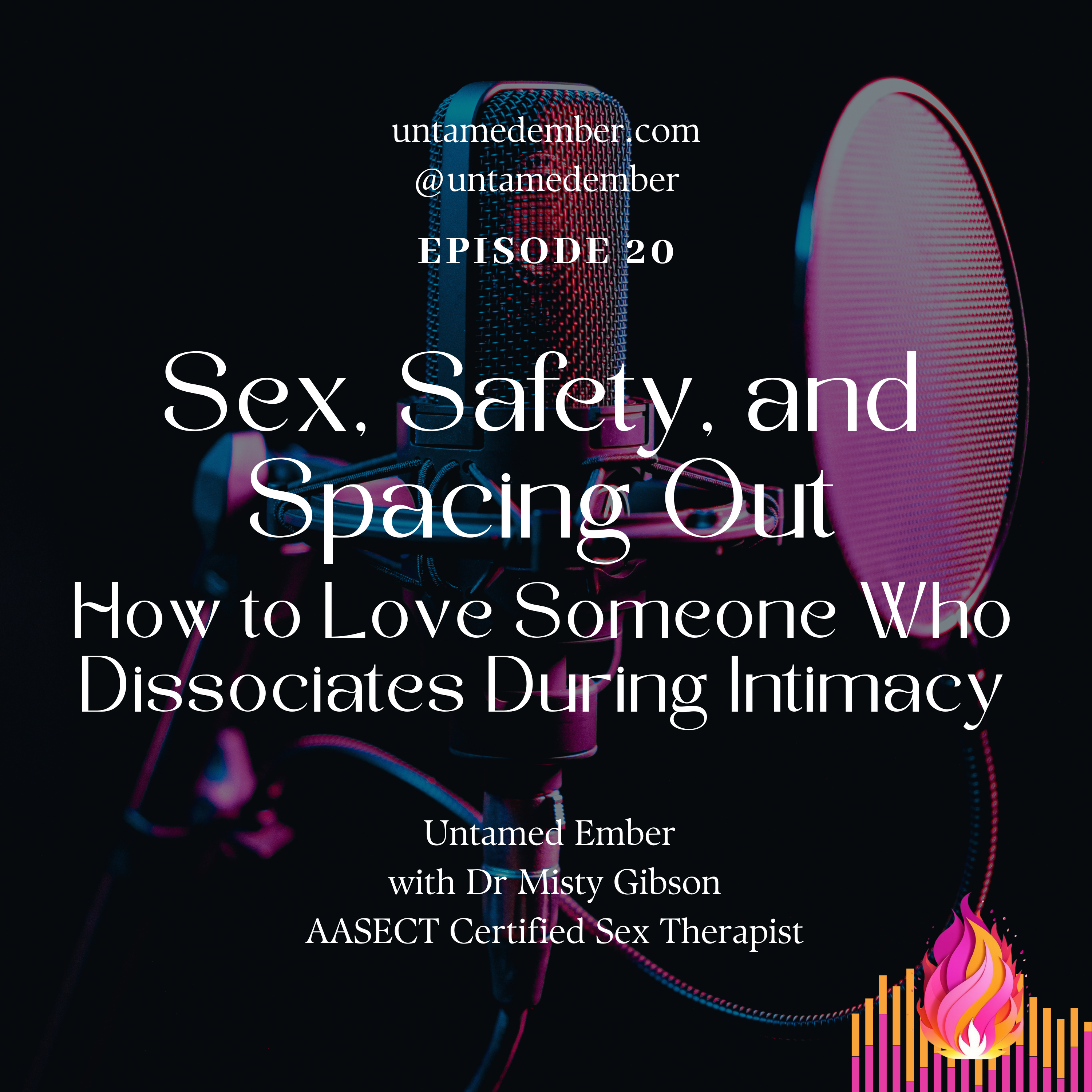Episode Transcript
[00:00:02] Hey there, loves. This is Dr. Misty with Untamed Ember. And today we're diving into the shadowy intersection where sexuality meets systems of control. Think back with me for a moment. Maybe you were sitting in a church pew or classroom or at a family dinner table.
[00:00:19] Maybe you were 11 or 15 or 20.
[00:00:24] But somewhere along the way, someone in authority looked you in the eye and delivered some version of this message. Your body isn't really yours. Maybe they used religious language. Your body is a temple. Save yourself for marriage. Lustful thoughts are as sinful as lustful actions. Maybe they used cultural scripts. Good girls don't.
[00:00:46] Boys will be boys.
[00:00:48] That's just not what we do in this family.
[00:00:51] Maybe they never had to say the words at all because the silence around pleasure spoke volumes. The awkward subject changes, the books hastily removed from your hands. The shame that hung in the air so thick you could taste it.
[00:01:06] Whatever form it took, the message was unmistakable. Desire is dangerous. Pleasure is suspicious. Your body needs to be controlled, preferably by someone other than you.
[00:01:19] Preferably by someone with a penis.
[00:01:22] And here's what nobody tells you. These messages don't just live in your mind. They don't just influence your conscious beliefs or decisions. They literally rewire your nervous system. They create neurobiological patterns that persist long after you've intellectually rejected them. That's why you can be years or even decades removed from purity culture, from religious environments, from family systems that shamed sexuality, and still experience your body shutting down during intimacy, still feel those waves of inexplicable shame washing over you during pleasure, still find yourself dissociating at the precise moment when connection should be deepest.
[00:02:04] Your conscious mind has moved on, but your body is still living under occupation.
[00:02:09] Your nervous system is still running the programs installed by systems designed to control your autonomy or police your pleasure and keep you obedient through the weaponization of shame. Today, we're pulling back the curtain on how high control systems target the body as their primary site of control. We'll explore how these systems quite literally get under your skin, shaping your nervous system's response to pleasure. And most importantly, we'll talk about how to begin the radical work of liberation, reclaiming your right to embodiment not just intellectually, but somatically.
[00:02:45] Because here is the truth. Your body was never meant to be a battleground for other people's ideologies.
[00:02:51] Your pleasure was never meant to be policed by systems of control.
[00:02:56] And it is absolutely possible to rewire these neural pathways to decolonize your nervous system and to Come home to a sexuality that genuinely belongs to you. So if you've ever felt the ghost of religious shame, the echo of cultural conditioning or. Or the weight of family expectations showing up uninvited in your bedroom, this one's for you. Let's get into it.
[00:03:21] If this is already resonating with you, know that you are far from alone. The journey from externally controlled sexuality to authentic embodiment is one that so many of us navigate, often without a roadmap.
[00:03:35] That's what we're creating together today.
[00:03:38] In this episode, we'll explore three main territories. First, we'll dive into how high control systems, especially religious, cultural, and familial institutions, specifically target the body and pleasure as sites of control.
[00:03:52] We'll unpack why sexuality is so often the battleground where power struggles play out.
[00:03:59] Next, we'll explore the Parts work framework, looking at the internal protectors, managers and exiles that form in response to sexual shame and how they continue to operate long after you've consciously rejected the beliefs that created them.
[00:04:15] Finally, we'll talk about practical liberation practices, somatic approaches for reclaiming your fundamental right to embodiment and pleasure outside of external control systems.
[00:04:27] This conversation matters because sexual liberation isn't just about what you do in the bedroom. It's about who gets to determine your relationship with your own body.
[00:04:37] It's about dismantling systems that use shame as a mechanism of control.
[00:04:43] And ultimately, it's about reclaiming your birthright to joy, connection, and autonomy.
[00:04:49] So get comfortable, take a deep breath, and let's begin the work of decolonizing your nervous system together.
[00:04:56] To understand why your body might still be responding to religious conditioning you intellectually rejected years ago.
[00:05:04] We need to look at how high control systems operate and why they so consistently target sexuality as their primary mechanism of control.
[00:05:14] Think about it. Across vastly different religious traditions, cultural contexts, and historical periods, one element remains strikingly consistent the regulation of sexual behavior.
[00:05:26] Whether we're talking about Christianity, Islam, Judaism, Hinduism, or secular ideologies, control of sexuality features prominently in the rulebook.
[00:05:37] This isn't random. It's strategic, because systems seeking to control populations understand a fundamental truth. If you can control someone's relationship with their own body, you can control almost everything else about them.
[00:05:52] Here's how this works. When a high control system successfully instills shame around natural bodily functions and desires, it creates a profound internal split.
[00:06:04] When a high control system successfully instills shame around natural bodily functions and desires, it creates a profound internal split. You become alienated from your own physical experiences.
[00:06:17] Your body becomes Something dangerous that must be monitored, controlled and contained. Rather than a source of wisdom and pleasure.
[00:06:25] This alienation from embodiment serves several purposes.
[00:06:29] First, it creates dependence on external authority. If you can't trust your own bodily sensations and desires, you need someone else to tell you what's acceptable. Your internal compass gets replaced with external rules.
[00:06:43] Second. Second, it generates perpetual shame, which is an incredibly effective control mechanism.
[00:06:50] Unlike guilt, which is about an action, I did something bad.
[00:06:54] Shame is about identity. I am bad.
[00:06:58] Shame keeps people isolated, compliant, and desperate for redemption or acceptance.
[00:07:05] Third, it disrupts your connection to your intuition.
[00:07:09] Our bodies often register subtle warning signs or attractions before our conscious minds catch up.
[00:07:15] When you're disconnected from your embodied knowing, you become easier to manipulate and control.
[00:07:21] For those raised in purity culture, specifically, this plays out in particularly damaging ways. Purity culture doesn't just forbid certain sexual activities. It pathologizes desire itself. It teaches that even having sexual thoughts is sinful, that bodies, particularly femme bodies, are inherently dangerous, and that virtue requires constant vigilance against your own embodied nature.
[00:07:48] The neurobiological impact of these teachings is profound.
[00:07:52] Your developing nervous system learns to associate arousal with danger, pleasure with punishment, and desire with shame. These associations aren't just psychological, they're physical, creating actual neural pathways that connect sexuality with threat response.
[00:08:09] Through this conditioning, your autonomic nervous system, the part that regulates bodily functions outside conscious control, learns to activate protective responses whenever sexual feelings arise.
[00:08:22] This might look like dissociation, anxiety, physical pain, or even disgust responses, all happening automatically without your conscious choice.
[00:08:32] This explains why simply changing your beliefs often isn't enough to change your sexual experience.
[00:08:38] You might intellectually reject purity culture completely while your body continues responding as if those rules still apply.
[00:08:47] Because your nervous system is still running the protection programs installed during those formative years, it's important to note that this impact is often amplified for those with marginalized identities. If you're queer, trans, disabled, neurodivergent, or otherwise existing outside the narrow parameters of what religious systems define as normal, the messaging you received wasn't just that sexuality needs regulation, but that your very existence is problematic.
[00:09:17] Understanding this helps shift the narrative from personal failure, what's wrong with me? To systemic to systemic impact. How were these responses installed and by whom?
[00:09:30] This shift is crucial because it moves us from shame to righteous anger. And anger, when channeled effectively, can be a powerful force for liberation.
[00:09:41] Because here's the truth. The control of sexuality has never been about morality. It's been about power and conformity and maintaining hierarchies.
[00:09:51] And recognizing this is the first step towards reclaiming what was taken from you, your fundamental right to an embodied existence that belongs to you alone.
[00:10:01] Now that we understand how external control systems target the body, let's talk about how these experiences create what therapists call parts, the internal protectors, managers and exiles that form in response to sexual shame.
[00:10:16] Internal family systems theory gives us a powerful framework for understanding why you might feel so conflicted about sexuality. According to ifs, we're not single, unified selves, but collections of parts, each with their own needs, fears and protective strategies. And nowhere do these parts clash more dramatically than then around sexuality, especially when religious conditioning is involved.
[00:10:42] When a young person receives messaging that their natural desires are sinful, dangerous or disgusting, their psyche responds by creating protective parts designed to manage these impossible contradictions.
[00:10:55] Let's meet some of the most common parts that form in response to religious sexual shame.
[00:11:01] First, there's the enforcer part.
[00:11:04] This internal monitor vigilantly polices your thoughts, feelings and behaviors against perceived moral violations.
[00:11:12] This part internalized external rules and now enforces them from within. The enforcer might manifest as an inner critical voice that shames you during or after sexual experiences or triggers dissociation the moment arousal begins.
[00:11:28] Then there's the performer part. This part learn that your worth depends on your adherence to sexual standards set by others. It's hyper aware of how you're being perceived and will sacrifice authentic pleasure for the appearance of goodness.
[00:11:44] During intimacy. The performer might be so focused doing sex correctly that actual presence becomes impossible.
[00:11:52] Then there's often a denier part that simply shuts down awareness of desire completely. This part decides that if sexual feelings are dangerous, the safest strategy is to not feel them at all. The denier might manifest as numbness, disinterest, or genuine confusion about what pleasure even feels like in your body.
[00:12:10] Many survivors of religious sexual shame also develop a rebel part that rejects the rules entirely, sometimes in ways that create new kinds of harm.
[00:12:21] This part might push you towards sexual experiences that don't actually feel good and but serve as proof that you've escaped that high demand control.
[00:12:29] The rebel is fighting for your freedom, but sometimes uses strategies that leave you feeling empty or disconnected.
[00:12:37] And beneath all these protective parts are the exiles, the vulnerable, passionate, desiring aspects of yourself that were banished because they were deemed too dangerous.
[00:12:48] These exiled parts carry the genuine capacity for embodied pleasure, but they've been locked away, sometimes for decades, because the system believed their emergence would lead to rejection, punishment, or moral collapse.
[00:13:01] Understanding this internal system helps explain why sexual healing often feels like an impossible task. You're not just changing beliefs or behaviors.
[00:13:11] You're negotiating with an entire committee of parts, each with their own agenda and protective strategies. The part of you that genuinely wants sexual connection and might get consistently overruled by a protective part that dissociates at the first hint of arousal.
[00:13:28] The part of you that craves surrender might be blocked by a manager part that needs to maintain control at all costs.
[00:13:35] The part of you that desires pleasure might be silenced by a shame part still carrying those old high demand messages.
[00:13:43] What's crucial here is recognizing that all these parts, even the ones that seem to sabotage your sexuality, were originally created to protect you.
[00:13:54] They're not enemies to be defeated, but aspects of yourself that need understanding and integration.
[00:14:00] Their journey toward embodied sexuality isn't about silencing these protective parts. It's about understanding their concerns, appreciating their intentions, and creating enough internal safety that they no longer need to use such extreme strategies.
[00:14:16] When you approach these parts with curiosity rather than frustration, something remarkable happens. They begin to reveal what they're really protecting. Often young, vulnerable aspects of yourself that experienced rejection, shame, or confusion around your embodied nature.
[00:14:33] And when these exiled parts are finally witnessed and embraced, your relationship with pleasure can fundamentally transform.
[00:14:40] This internal work creates the foundation for external liberation.
[00:14:45] Because true sexual freedom isn't just about what you're allowed to do. It's about developing an internal system where all parts of you feel safe enough to be present during intimacy.
[00:14:56] Understanding your internal parts is powerful. But to fully grasp why high demand conditioning has such a lasting impact on sexuality, we need to look at what's happening in your nervous system. The actual neurobiological mechanisms that connect past high demand messaging to to present sexual experiences.
[00:15:15] When a developing brain receives consistent messaging that sexuality is dangerous, sinful or shameful, something profound happens. Through a process called classical conditioning, your autonomic nervous system creates associations between sexual arousal and threat response. This isn't a conscious process. It happens at the level of your most primitive brain structures, creating automatic reactions that bypass your rational thinking. Let me give you a concrete example of how this works. Imagine a teenager raised in purity culture who masturbates and then experiences intense guilt afterwards.
[00:15:52] Each time the cycle repeats, their nervous system strengthens the neural pathway connecting pleasure with punishment. Eventually, the mere thought of sexual pleasure automatically activates threat response, creating anxiety, shame, or dissociation before any actual pleasure can be experienced. This conditioning is particularly powerful because it often begins before the rational, discerning prefrontal cortex is fully developed. High demand sexual messaging typically starts in childhood or early adolescence. Targeting the brain during its most plastic, impressionable phases. The associations formed during these periods become deeply embedded in implicit memory, the unconscious bodily memory that operates outside conscious awareness. For neurodivergent folks, this impact can be even more pronounced. If you're autistic, adhd, or otherwise neurodivergent. Your nervous system often processes sensory and emotional information differently.
[00:16:47] High control environments that demand conformity and emotional compliance can create profound dysregulation for neurodivergent nervous systems, amplifying the somatic impact of sexual shame. This explains why you can intellectually reject religious teachings while your body continues responding as if they're still true. Your explicit memory, the conscious narrative memory, may have moved on, but your implicit memory, the bodily sensory memory, is still running the old programs. It also explains why sexual difficulties related to religious trauma often manifest as specific somatic symptoms. Vaginismus, erectile issues, chronic pelvic tension, dissociation during arousal. These aren't psychological problems with physical symptoms. They're direct expressions of a nervous system that has learned to associate sexuality with danger.
[00:17:38] The polyvagal theory we discussed in our previous episode helps us understand the specific ways religious trauma impacts sexual function.
[00:17:48] When your nervous system perceives threat, even when that threat is just your own arousal, it can shift from safe and social mode into protective sympathetic activation, creating anxiety or hypervigilance during sex or dorsal vagal shutdown, creating numbness or dissociation.
[00:18:06] What's fascinating is that these same neurobiological mechanisms that created the problem also offer the path toward healing. Neuroplasticity. Your brain's lifelong ability to rewire itself through experience means that high demand sexual conditioning can be revised.
[00:18:26] The same nervous system that learned to associate pleasure with danger can learn to associate it with safety. This relearning doesn't happen through intellectual understanding alone, because the conditioning lives in implicit body memory. The revision must happen through embodied experiences that directly contradict the original associations.
[00:18:47] You can't think your way out of religious body shame. You have to feel your way out, creating new somatic experiences that gradually retrain your nervous system.
[00:18:57] Understanding this neurobiological dimension helps remove shame from the equation. Your sexual responses aren't moral failures or signs of weakness. They're predictable adaptations of a nervous system shaped by powerful conditioning.
[00:19:12] And once you understand the mechanisms at work, you can begin the process of deliberately retraining those same systems towards pleasure and embodiment.
[00:19:22] Now that we understand how high demand conditioning gets embedded in your nervous system, let's talk about practical approaches for reclaiming your erotic Sovereignty Creating an Embodied Sexuality we're going to create an embodied sexuality that genuinely belongs to you, rather than a systems that serve sought to control you.
[00:19:43] First and foremost, liberation requires creating a new relationship with shame, not eliminating it. That's often impossible, given how deeply it's wired in, but learning to recognize shame as a visitor rather than a truth teller. When shame arises during sexual experiences, practice naming it. I notice shame is showing up right now.
[00:20:06] This small act of witnessing creates crucial distance between you and the shame response.
[00:20:13] For those with parts that shut down pleasure, regular parts work dialogue can be transformative.
[00:20:19] Set aside time outside of sexual contexts to have conversations with your protective parts. Ask them questions like what are you afraid would happen if I fully experienced pleasure? What are you trying to protect me from?
[00:20:34] What would you need to feel safer?
[00:20:36] This isn't an abstract psychological exercise. It's a somatic practice of creating internal communication between aspects of yourself that have been in conflict.
[00:20:46] As you build relationships with these protective parts, they often relax their grip on your sexuality, allowing more authentic desire to emerge.
[00:20:56] Another powerful practice is creating a pleasure inventory completely separate from religious definitions of sexuality. High control environments typically define sex in extremely narrow terms focused on specific acts.
[00:21:10] Liberation means reclaiming the full spectrum of embodied pleasure on your own terms.
[00:21:17] Make a list of sensations that feel genuinely good in your body without any agenda for where they might lead. The warmth of sunshine on your skin. The texture of velvet against your palm.
[00:21:29] The taste of something delicious melting in your mouth. This practice reconnects you to embodied pleasure as your birthright, rather than something regulated by external authority.
[00:21:40] For those dealing with specific somatic symptoms like pelvic floor tension, vaginismus, or erectile issues related to high demand conditioning, working with trauma Informed somatic practitioners can be incredibly helpful. Look for professionals familiar with high demand trauma who combine body work with emotional processing. Pelvic floor physical therapists, somatic experiencing practitioners, or sexological body workers, perhaps most importantly, develop practices that help you reclaim your body as your own territory, not owned by God, the church, family, or culture.
[00:22:20] This might look like creating personal rituals of embodiment. Intentionally feeling the sensations of your body while affirming this body, body belongs to me. It might involve adorning your body in ways forbidden in religious context through tattoos or piercings, or moving in ways that were discouraged. Dancing or moving in ways that were discouraged.
[00:22:40] For neurodivergent folks especially, sensory reclamation can be revolutionary.
[00:22:45] High control environments often demand masking and sensory compliance. Deliberately engaging with sensory experiences that feel authentic to your neurology. Seeking specific textures or pressures. Allowing yourself natural movement patterns directly counters high demand body control.
[00:23:04] Throughout all these practices, remember that liberation isn't a destination, but an ongoing process.
[00:23:11] There will be setbacks moments when old conditioning resurfaces strongly. When this happens, approach yourself with fierce compassion.
[00:23:20] Your nervous system is doing exactly what it was trained to do. And each time you meet these responses with understanding rather than judgment, you create new neural pathways toward embodied freedom.
[00:23:33] It's also worth acknowledging that community plays a crucial role in liberation.
[00:23:39] High demand sexual shame thrives on isolation, convincing you that you're uniquely broken or sinful.
[00:23:47] Finding spaces where others openly discuss their journeys of sexual reclamation can profoundly disrupt shame's power.
[00:23:55] Whether online forums, therapy groups, or workshops focused on high demand trauma recovery, witnessing others parallel journeys helped externalize what felt deeply personal. Remember that reclaiming pleasure after high demand conditioning isn't self indulgence. It's revolutionary resistance against systems that use your body as a site of control.
[00:24:18] Your pleasure isn't just personal, it's political.
[00:24:22] It represents your fundamental right to bodily autonomy in a world that continually attempts to regulate marginalized bodies.
[00:24:31] As we close today's episode, I want to invite you into a brief reflection. Practice a moment to begin the work of reclaiming your body as your own sovereign territory.
[00:24:43] Take a comfortable position and place one hand somewhere on your body. Perhaps on your heart or your belly, or any place that feels right. Take a few breaths, feeling the rise and fall of your body beneath your palm.
[00:24:56] Now, if it feels accessible silently, or speak these words to your body.
[00:25:01] This body belongs to me. Not to any church, not to any religion, not to any family system, not to any cultural authority.
[00:25:11] This body is my home, my birthright, my own sacred territory.
[00:25:17] Notice what arises as you say these words. You might feel resistance, grief, anger, relief, or nothing at all. Whatever emerges, simply witness it with compassion. These responses are part of your liberation journey. Remember that decolonizing your sexuality from high demand control is not a single event, but a practice of reclamation that unfolds over time. Each time you choose embodiment over dissociation, pleasure over shame, your authentic desires over external rules, you are engaged in revolutionary work.
[00:25:51] You're not alone in this journey. Countless others are walking parallel paths, dismantling the same systems of control, reclaiming their bodies from the same authorities.
[00:26:00] Your personal liberation contributes to our collective freedom.
[00:26:05] This week, I invite you to continue this reflection in whatever way feels accessible. Maybe it's journaling about which parts of your sexuality still feel owned by those high demand messages.
[00:26:16] Maybe it's creating a small daily practice of embodiment. Or maybe it's simply sitting with the radical possibility that your pleasure belongs to you alone.
[00:26:26] So if this episode hit you right in the heart and soul, don't forget to get the worksheet in the Ember vault@untamed ember.com until next time. This is me reminding you that your body was never the sin. The systems that taught you to fear it were the true transgressions. And your journey back to embodied joy is not just healing, it's justice. See you next episode.




